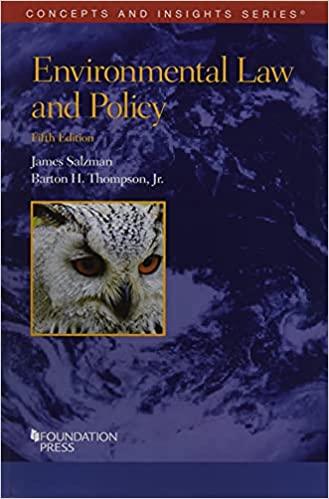Question
1. Following several news leaks, the President executed an executive order banning all executive employees from having conversations with members of the press unless prior
1. Following several news leaks, the President executed an executive order banning all executive employees from having conversations with members of the press unless prior permission had been obtained from an administrative supervisor. The order called for dismissal of any employee willfully in violation of the order. After, one of the Vice President's senior advisors leaked a story to a magazine about the Vice President. The magazine printed the story and named the senior advisor as the source. At a hearing, the court found that the senior advisor violated the order and dismissed him from his position. The senior advisor filed a lawsuit seeking to be reinstated in her job and challenging the constitutionality of the executive order. If her case reaches the U.S. Supreme Court, how should the Justices rule on the constitutionality of the executive order?
2. Remember Citizens United v. FEC? That's the U.S. Supreme Court case that gave corporations Free Speech protection. Access the CBS news clip Should First Amendment Protection Include Corporations? at http://www.youtube.com/watch?v=n57Fsnd6Im8&feature=fvsr. After reviewing the clip and applying what you have studied, please respond to the following:
a) Should corporations be grated free speech protection under the First Amendment? Why?
b) Would your answer change if Citizens United had arisen out of facts that were unrelated to elections/voting? Why?
3. An auditorium is owned by the city of Joshua Tree. A religious organization applied to rent the auditorium for one of their yearly celebrations. The Joshua Tree city council voted against permitting the religious organization to use the auditorium. When their rental application was denied, the religious organization threatened to sue the city for unfair discrimination. In response to this controversy, the city council passed an ordinance prohibiting the rental of the auditorium to "any religious group." The ordinance was passed during a closed-door city council meeting, without input from the community. If this new city ordinance is challenged in court, will it be held constitutional? Why?
4. How about prisons? The Court has considered a First Amendment right of access with regard to prisons. They have expressly rejected this right and have frequently ruled that the press is not entitled to more rights than the public, thereby restricting the ability of the press to interview prisoners or have access to prisons. In Houchins v, KQED, the Court considered whether the press should have access to the Greystone facility at the Santa Rita jail. Check out the opinion in Canvas.
Step by Step Solution
There are 3 Steps involved in it
Step: 1

Get Instant Access to Expert-Tailored Solutions
See step-by-step solutions with expert insights and AI powered tools for academic success
Step: 2

Step: 3

Ace Your Homework with AI
Get the answers you need in no time with our AI-driven, step-by-step assistance
Get Started


